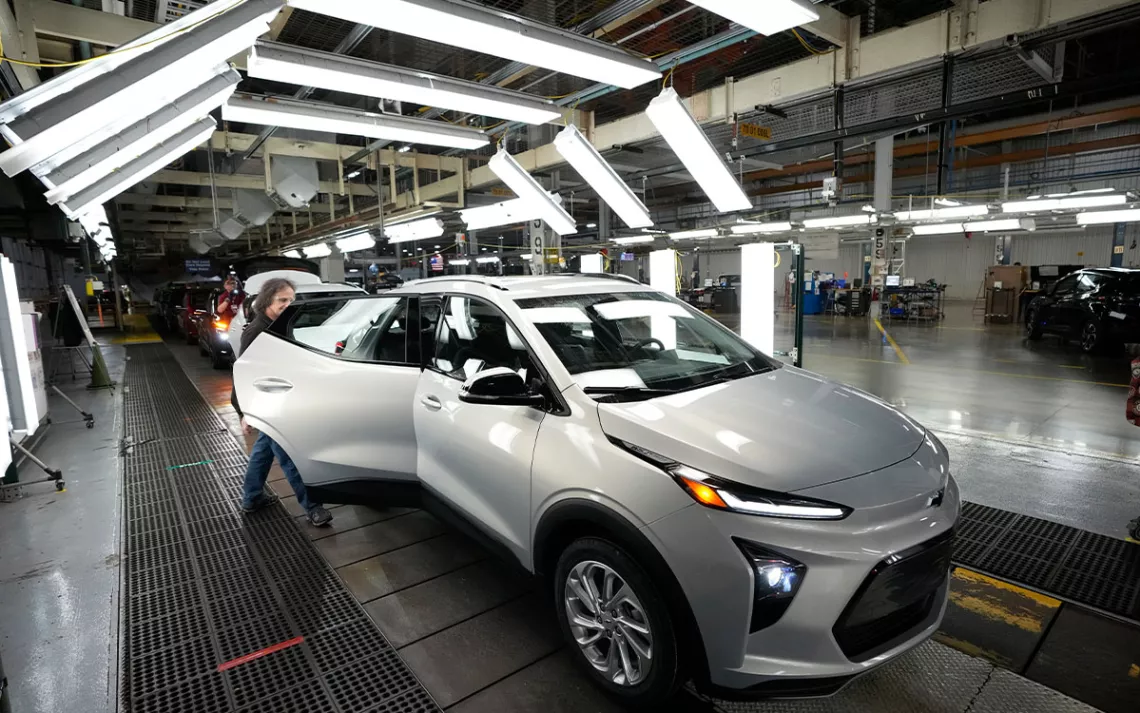The UAW Strike Is About the EVs
The union doesn’t want the transition to electric vehicles to be a “race to the bottom”

An assembly-line worker looks over a 2023 Chevrolet Bolt EUV. | Photo by Carlos Osorio/AP
The current strike by the United Auto Workers against the Detroit carmakers is, in part, about the transition to electric vehicles. A key union demand—in addition to a 40 percent wage increase, endorsed last week by President Biden when he joined a UAW picket line—is job security for union members as the auto industry reshapes itself. The union wants both a guaranteed right to strike when internal-combustion plants close and compensation for displaced workers in the event of such a shutdown.
In a white paper on EVs, the UAW worries about the job loss inherent in shifting from making complex engines and transmissions to “mechanically simpler lithium-ion batteries and electric motors.” And, it added, “EV batteries are mostly made by suppliers in other countries, with China in the lead.”
General Motors president Mark Reuss told the Detroit Free Press that the union’s demands are “untenable” and fail to recognize the large expense of the EV transition. “If we don’t continue to invest, we will lose ground—quickly,” he said. “Our competitors across the country and around the world, most of whom are nonunion, will waste no time seizing the opportunity we would be handing them.”
Indeed, a primary beneficiary of the strike thus far is nonunion Tesla Motors. The UAW’s demands, trolls Elon Musk, would “drive GM, Ford, and Chrysler bankrupt in the fast lane.” With all the world’s automakers pushing toward electrification, Tesla is already in the lead with a full line of EVs being produced around the world. The Tesla Model Y is now the bestselling car in Europe and in fact the whole world, as well as the second best in the US (after the Ford F-150).
The pre-eminence of foreign EV manufacturers and battery suppliers was seized on by former president Donald Trump, who said in a September 27 speech at Drake Enterprises, a parts plant in Michigan, that American workers were “getting screwed” by overseas EV jobs. UAW president Shawn Fain responded, calling it a “pathetic irony” that Trump made those remarks at a nonunion plant. Fain says that the union accepts that the EV transition is happening but that it wants “a just transition, where it has our labor standards in there, not paying poverty wages and not a race to the bottom.” (The Sierra Club is among the many environmental and social justice groups in the Labor Network for Sustainability endorsing the UAW’s demands.)
Partly as a result of the Biden administration’s Inflation Reduction Act, domestic EV jobs are on the rise. There are more total US auto jobs under Biden now than the peak for Trump, who publicly campaigned to stop plant closures, The New York Times reported. The IRA provides financial incentives for batteries and the cars they go into to be made in the US, along with domestic mining of rare-earth minerals such as cobalt (now largely sourced in the troubled Democratic Republic of the Congo).
Since the IRA was passed, companies are flocking to take advantage of those incentives, including Rivian, Hyundai, Redwood Materials, Toyota, LG, General Motors, Stellantis, Samsung, Albemarle, and ABB. According to Ben Prochazka, executive director of the Electrification Coalition, “Thanks to the Inflation Reduction Act, we are in a much better place than we were two years ago.” Production of EV chargers is also moving into the US, encouraged by “Buy American” funding.
Sam Abuelsamid, principal analyst for transportation and mobility at Guidehouse Insights, told Sierra, “With upwards of 20 factories, there are likely to be 50,000 new jobs at cell plants and more in the supply chain for batteries.” The Energy Department said in August that it would offer $2 billion in grants and $10 billion in loans to transition legacy factories to producing EVs. Between 2015 and 2023, according to the Environmental Defense Fund, total US investment in EVs, batteries, and battery components has totaled $120 billion, providing 143,000 jobs.
The new positions are not, however, likely to pay as much as existing union jobs, and many of the new auto plants are in southeastern states with right-to-work laws. John McElroy, an auto analyst at Autoline, notes that thus far the UAW has had zero success at unionizing what are known as “transplant” manufacturing facilities owned by non-US automakers such as Honda, Mercedes, and Subaru. (It did unionize one joint venture—General Motors’ Ultium battery plant in Lordstown, Ohio—last year.) “Tesla already has a $20 an hour cost advantage, paying just $45 compared to $65 at the Detroit Three,” said McElroy.
(Even when a proposed plant is in the US, there’s controversy. Some residents of Green Charter Township in Michigan are unhappy that a proposed $2.4 billion battery plant in their town, subsidized by $800 million in state grants and tax exemptions, would be built by Gotion, the subsidiary of a Chinese company.)
The Detroit Three have a heavy lift ahead. With union labor, they have to build high-quality, exciting electric cars in the US that can compete with Tesla, and sell them at affordable prices. When Representative Alexandria Ocasio-Cortez (D-NY) said she wanted to replace her Tesla with an EV made in the US by union labor, her choices were few. Because the Hummer EV probably wouldn’t meet her needs, the Chevy Bolt is her likely best bet. And when Ford and GM failed to establish reliable national EV charging networks of their own, they agreed to sign on to the one such network that actually works—Tesla’s.
“If you sell it here, you should build it here,” the UAW says. The union takes credit for auto bargaining that has resulted in $20 billion in investment and 25,000 new or retained jobs. But the transition to EVs is its biggest challenge thus far.
 The Magazine of The Sierra Club
The Magazine of The Sierra Club



